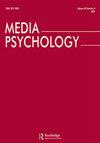Disentangling Between-Person Level From Within-Person Level Relationships: How Sharing Alcohol References on Facebook and Alcohol Use Are Associated Over Time
IF 2.6
2区 心理学
Q1 COMMUNICATION
引用次数: 3
Abstract
ABSTRACT A growing body of research supports that publicly displayed alcohol references on social media are positively associated with alcohol use among college students. However, unaddressed questions remain, particularly what types of alcohol references (i.e., alcohol use vs. intoxication) have such influence, and whether the association between sharing alcohol references on social media and drinking behavior is a within-person effect, or rather reflects group differences. The current study (N = 338) used secondary data analysis of a four-wave longitudinal dataset collected as part of a larger project, which evaluated college students’ Facebook profiles and their alcohol use across their college experience. Using a random intercept cross-lagged panel analysis, we found empirical support for a positive relationship between sharing alcohol references and alcohol use at between-person level rather than the within-person level. Moreover, there was a negative relationship between sharing intoxication alcohol references on Facebook and alcohol use at the within-person level. This means that we find more support for the idea that the association between sharing alcohol references on social media and drinking behavior reflects group differences, rather than true self-effect of social media use.从个人层面的关系中分离人与人之间的关系:在Facebook上分享酒精和饮酒是如何随着时间的推移而联系在一起的
越来越多的研究表明,在社交媒体上公开展示的酒精信息与大学生的酒精使用呈正相关。然而,尚未解决的问题仍然存在,特别是哪种类型的酒精参考(即酒精使用与醉酒)会产生这种影响,以及在社交媒体上分享酒精参考与饮酒行为之间的关联是一种个人影响,还是反映了群体差异。目前的研究(N = 338)使用了一个四波纵向数据集的二次数据分析,该数据集是一个更大项目的一部分,该项目评估了大学生在大学期间的Facebook个人资料和酒精使用情况。使用随机截距交叉滞后面板分析,我们发现在人与人之间而不是人与人之间分享酒精参考和酒精使用之间存在正相关的实证支持。此外,在Facebook上分享醉酒酒精参考资料与个人层面的酒精使用之间存在负相关关系。这意味着我们发现更多的证据支持这样一种观点,即在社交媒体上分享酒精信息和饮酒行为之间的联系反映了群体差异,而不是社交媒体使用的真正自我效应。
本文章由计算机程序翻译,如有差异,请以英文原文为准。
求助全文
约1分钟内获得全文
求助全文
来源期刊

Media Psychology
Multiple-
CiteScore
8.60
自引率
7.10%
发文量
30
期刊介绍:
Media Psychology is an interdisciplinary journal devoted to publishing theoretically-oriented empirical research that is at the intersection of psychology and media communication. These topics include media uses, processes, and effects. Such research is already well represented in mainstream journals in psychology and communication, but its publication is dispersed across many sources. Therefore, scholars working on common issues and problems in various disciplines often cannot fully utilize the contributions of kindred spirits in cognate disciplines.
 求助内容:
求助内容: 应助结果提醒方式:
应助结果提醒方式:


